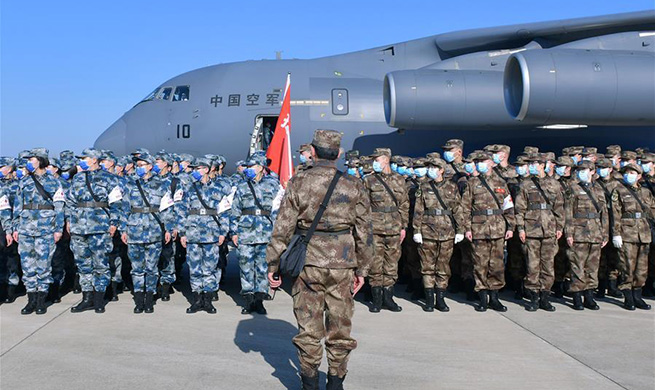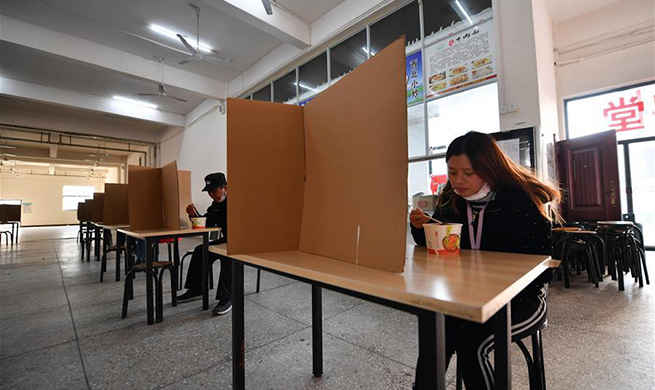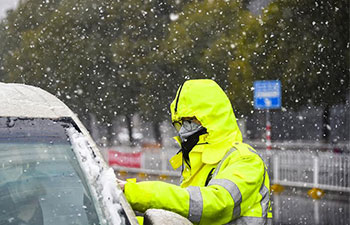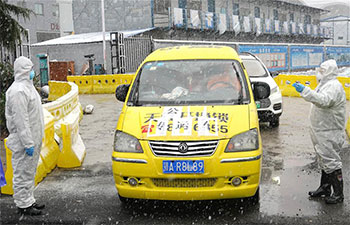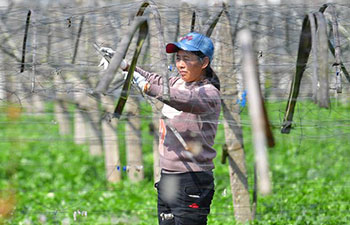by Christopher Guly
OTTAWA, Feb. 17 (Xinhua) -- Shortages of food and fuel could be among the fallout from continuing rail blockades by Indigenous groups and environmental activists protesting against a natural-gas pipeline project on Canada's west coast, warn the country's retailers and manufacturers.
On Friday, Canadian National Railway Company (CN) began ceasing operations in eastern Canada. Via Rail, the country's national passenger-rail service was completely shut down after court orders the company obtained to end the blockades in Canada's most populous province of Ontario were ignored.
CN transports more than 189-billion-U.S. dollar-worth of goods across Canada and the United States annually. But Canada's largest cargo rail network has been ground to a halt in Ontario and in the west coast Canadian province of British Columbia (B.C.) since the first week of February when protesters opposing to a 670-km long, nearly 5-billion-dollar pipeline running through Indigenous territory on the west coast blocked rail lines. There have also been blockades of ports off the B.C. coast.
The ongoing disruption to rail service led the Canadian Chamber of Commerce, which represents about 200,000 businesses crossing all sectors in the country, to issue a statement last week, in which it said that Canada's supply chains -- from propane to grain and food and consumer items -- "are being severely damaged by the continuing interruptions."
In a joint statement released on Friday, the Retail Council of Canada and Food & Consumer Products Canada, which together employ nearly 2.4 million Canadians, said "the implications of extended blockades are that there will be shortages on shelves, that groceries and necessary household products will not get through to consumers and that there will be spoilage of fresh food and other time-sensitive items, in turn affecting Canada's agricultural and agri-food sector among others."
The two associations noted that the rail blockades are not just impacting food supply, but the delivery of other goods, such as personal hygiene products, infant formula, fire alarms "and the type of cleaning and sanitary products that help deal with concerns about the spread of influenza and other infectious diseases."
Also on Friday, Superior Propane, Canada's largest provider of that fuel in more than 10,000 communities, forecasted that it would face "critical supply shortages" in the dead of a cold Canadian winter not only to homes and businesses, but to such essential services as hospitals, retirement homes and emergency vehicle fleets.
Mining companies and those that make chemicals such as chlorine have also experienced disruptions due to the rail lockdown.
The Coastal GasLink pipeline -- part of a 30-billion-dollar project in northern B.C. -- had received support from elected band councils of Indigenous communities.
However, hereditary chiefs of the Wet'suwet'en First Nations people, who claim jurisdiction over 22,000 square kilometers of land in B.C., oppose the project, and the protests began last week after the Royal Canadian Mounted Police enforced a court injunction against Wet'suwet'en hereditary chiefs and their supporters.
The situation is difficult for both the government and police. Prime Minister Justin Trudeau has made reconciliation with Canada's First Nations -- an aboriginal group -- one of his government's top priorities, and law enforcement does not wish to provoke a confrontation with demonstrators, which in past standoffs has led to the death of a police officer, in 1990, and an Indigenous protester in 1995.
Energy-related protests could continue beyond Coastal GasLink. Trudeau's cabinet is expected to announce in February whether it will approve an oil-sands mine project by Teck Resources Ltd. in Alberta, a resource-rich province whose government solidly backs it. However, if the current rail shutdown affects crude-oil shipments, 400,000 barrels of oil could be taken out of commission, warned Alberta Premier Jason Kenney.
"This has become a national economic crisis," he said.






